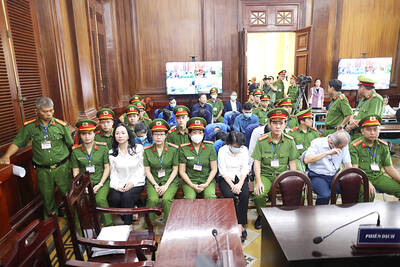India’s governing party on Saturday appointed a firebrand Hindu cleric to lead the country’s most populous state, a turning point for a government that has steered clear of openly embracing far-right Hindu causes.
The choice of Yogi Adityanath — who has been repeatedly accused of stirring anti-Muslim sentiments — to lead Uttar Pradesh, came as a shock to many political observers, who have become accustomed to the moderated public positions of Indian Prime Minister Narendra Modi.
Adityanath has openly called for India to be enshrined as a “Hindu rashtra,” or Hindu nation, and supports the rebuilding of a temple to the Hindu god Ram, also known as Rama, on the site of a razed 16th-century mosque, a project that was halted after it incited bloody religious riots in the 1990s.
With the appointment, Modi “is unveiling a vision of benign majoritarianism,” said Shekhar Gupta, an editor and political talk show host. “That means it’s a Hindu country, that’s the fact, and we’ll be nice to you if you behave yourself.”
For Modi, the appointment represents a “final rejection of Nehruvian socialism, which almost gave the minorities a slightly exalted status,” said Gupta, referring to Jawaharlal Nehru, India’s first prime minister and independence leader.
Adityanath called his victory a step forward for Hindus.

Republican US lawmakers on Friday criticized US President Joe Biden’s administration after sanctioned Chinese telecoms equipment giant Huawei unveiled a laptop this week powered by an Intel artificial intelligence (AI) chip. The US placed Huawei on a trade restriction list in 2019 for contravening Iran sanctions, part of a broader effort to hobble Beijing’s technological advances. Placement on the list means the company’s suppliers have to seek a special, difficult-to-obtain license before shipping to it. One such license, issued by then-US president Donald Trump’s administration, has allowed Intel to ship central processors to Huawei for use in laptops since 2020. China hardliners

A top Vietnamese property tycoon was on Thursday sentenced to death in one of the biggest corruption cases in history, with an estimated US$27 billion in damages. A panel of three hand-picked jurors and two judges rejected all defense arguments by Truong My Lan, chair of major developer Van Thinh Phat, who was found guilty of swindling cash from Saigon Commercial Bank (SCB) over a decade. “The defendant’s actions ... eroded people’s trust in the leadership of the [Communist] Party and state,” read the verdict at the trial in Ho Chi Minh City. After the five-week trial, 85 others were also sentenced on

Conjoined twins Lori and George Schappell, who pursued separate careers, interests and relationships during lives that defied medical expectations, died this month in Pennsylvania, funeral home officials said. They were 62. The twins, listed by Guinness World Records as the oldest living conjoined twins, died on April 7 at the Hospital of the University of Pennsylvania, obituaries posted by Leibensperger Funeral Homes of Hamburg said. The cause of death was not detailed. “When we were born, the doctors didn’t think we’d make 30, but we proved them wrong,” Lori said in an interview when they turned 50, the Philadelphia Inquirer reported. The

RAMPAGE: A Palestinian man was left dead after dozens of Israeli settlers searching for a missing 14-year-old boy stormed a village in the Israeli-occupied West Bank US President Joe Biden on Friday said he expected Iran to attack Israel “sooner, rather than later” and warned Tehran not to proceed. Asked by reporters about his message to Iran, Biden simply said: “Don’t,” underscoring Washington’s commitment to defend Israel. “We are devoted to the defense of Israel. We will support Israel. We will help defend Israel and Iran will not succeed,” he said. Biden said he would not divulge secure information, but said his expectation was that an attack could come “sooner, rather than later.” Israel braced on Friday for an attack by Iran or its proxies as warnings grew of